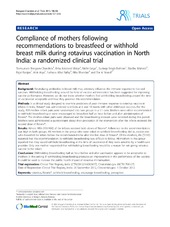| dc.contributor.author | Rongsen-Chandola, Temsunaro | en_US |
| dc.contributor.author | Winje, Brita Askeland | en_US |
| dc.contributor.author | Goyal, Nidhi | en_US |
| dc.contributor.author | Rathore, Sudeep Singh | en_US |
| dc.contributor.author | Mahesh, Madhu | en_US |
| dc.contributor.author | Ranjan, Rajat | en_US |
| dc.contributor.author | Arya, Alok | en_US |
| dc.contributor.author | Rafiqi, Farhana Afzal | en_US |
| dc.contributor.author | Bhandari, Nita | en_US |
| dc.contributor.author | Strand, Tor A. | en_US |
| dc.date.accessioned | 2015-02-24T13:18:21Z | |
| dc.date.available | 2015-02-24T13:18:21Z | |
| dc.date.issued | 2014-06-28 | eng |
| dc.identifier.issn | 1745-6215 | |
| dc.identifier.uri | https://hdl.handle.net/1956/9426 | |
| dc.description.abstract | Background: Neutralizing antibodies in breast milk may adversely influence the immune response to live oral vaccines. Withholding breastfeeding around the time of vaccine administration has been suggested for improving vaccine performance. However, we do not know whether mothers find withholding breastfeeding around the time of vaccination acceptable and how they perceive this recommendation. Methods: In a clinical study designed to examine predictors of poor immune response to rotavirus vaccine in infants in India, Rotarix® was administered to infants at 6 and 10 weeks with other childhood vaccines. For the study, 400 mother–infant pairs were randomized into two groups in a 1:1 ratio. Mothers were either recommended to withhold breastfeeding or were encouraged to breastfeed half an hour before and after administration of Rotarix®. The mother–infant pairs were observed and the breastfeeding intervals were recorded during this period. Mothers were administered a questionnaire about their perception of the intervention after the infants received the second dose of Rotarix®. Results: Almost 98% (391/400) of the infants received both doses of Rotarix®. Adherence to the recommendations was high in both groups. All mothers in the group who were asked to withhold breastfeeding did so, except one who breastfed her infant before the recommended time after the first dose of Rotarix®. Of the mothers, 4% (7/195) reported that the recommendation to withhold breastfeeding was difficult to follow. All mothers in this group reported that they would withhold breastfeeding at the time of vaccination if they were asked to by a health-care provider. Only one mother responded that withholding breastfeeding would be a reason for not giving rotavirus vaccine to her infant. Conclusions: Withholding breastfeeding half an hour before and after vaccination appears to be acceptable to mothers in this setting. If withholding breastfeeding produces an improvement in the performance of the vaccine, it could be used to increase the public health impact of rotavirus immunization. | en_US |
| dc.language.iso | eng | eng |
| dc.publisher | BioMed Central | eng |
| dc.rights | Attribution CC BY | eng |
| dc.rights.uri | http://creativecommons.org/licenses/by/2.0 | eng |
| dc.subject | rotavirus | eng |
| dc.subject | Rotarix® | eng |
| dc.subject | withhold breastfeeding | eng |
| dc.subject | encourage breastfeeding | eng |
| dc.subject | Perception | eng |
| dc.title | Compliance of mothers following recommendations to breastfeed or withhold breast milk during rotavirus vaccination in North India: A randomized clinical trial | en_US |
| dc.type | Peer reviewed | |
| dc.type | Journal article | |
| dc.date.updated | 2015-02-24T13:13:07Z | |
| dc.description.version | publishedVersion | en_US |
| dc.rights.holder | Copyright 2014 Rongsen-Chandola et al | |
| dc.source.articlenumber | 256 | |
| dc.identifier.doi | https://doi.org/10.1186/1745-6215-15-256 | |
| dc.identifier.cristin | 1151678 | |
| dc.source.journal | Trials | |
| dc.source.40 | 15 | |

